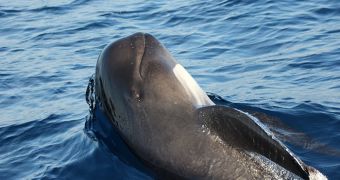Dozens of short-finned pilot whales are now stranded in Florida's Everglades National Park, and folks with the Marine Mammal Conservancy, Marine Animal Rescue, Florida Fish and Wildlife, and NOOA Fisheries are working around the clock trying to save them.
Information shared with the public says that authorities were first alerted that these marine mammals were stuck in the Everglades National Park and needed help getting back to the ocean this past Wednesday morning.
Conservationists and wildlife researchers were quick to arrive at the scene. By the time they got there, however, 6 of the whales were already dead. Another 4 had to be put to sleep due to the severity of their condition, PBS reports.
By the looks of it, 41 pilot whales are now left in the Everglades. Rescue teams in the area have repeatedly tried to guide them back to the ocean but, unfortunately, their attempts have all proven futile.
Huffington Post tells us that, presently, the whales are separated from their ocean home by about 20 miles of sand bars and channels.
Wildlife researchers fear that, unless rescuers can convince the whales to work their way over these sand bars and channels, they will soon die.
“This is a very difficult situation. The outlook does not ultimately look good for the remaining live whales,” Blair Mase with NOAA reportedly told the press during a conference call.
Like other marine mammals, pilot whales are a very cohesive species, meaning that these animals stick together no matter what. This means that, if just one of them cannot leave the Everglades for some reason, the others are likely to remain by its side and share its fate.
For the time being, specialists are unable to say what caused the whales to become stranded in the Everglades. They suspect that disease, human impact or environmental factors might be to blame.
As Blair Mase put it, “It could be disease, it could be environmental issues, it could be [related to] human impact.”

 14 DAY TRIAL //
14 DAY TRIAL //